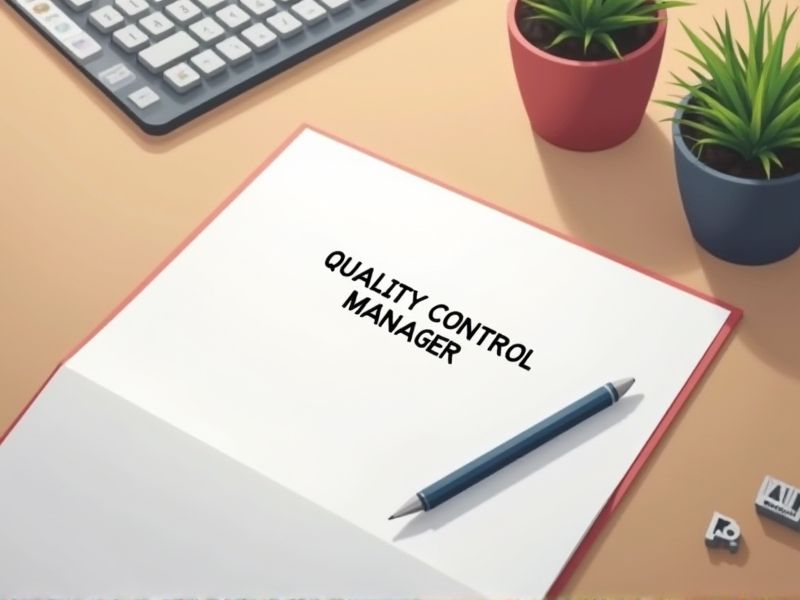
Quality Control Managers ensure products and services meet consistent standards, impacting consumer satisfaction and regulatory compliance. Certifications provide a structured framework for understanding industry best practices and methodologies essential for quality management. They equip managers with necessary skills to identify, analyze, and mitigate risks in production processes. Below are some key certifications that are beneficial for a Quality Control Manager.
Certified Quality Engineer (CQE)
Certified Quality Engineers (CQEs) possess specialized knowledge in quality principles, enabling them to significantly improve operational efficiency. This expertise allows Quality Control Managers to implement industry-standard practices effectively, reducing defects and enhancing product reliability. A CQE's experience in statistical tools aids in precise decision-making, crucial for maintaining compliance with regulatory standards. In competitive markets, employing a CQE can lead to cost savings by optimizing processes and minimizing waste.
Certified Manager of Quality/Organizational Excellence (CMQ/OE)
The Certified Manager of Quality/Organizational Excellence (CMQ/OE) credential enhances a quality control manager's expertise in strategic planning and organizational management, leading to improved decision-making processes. Holding the CMQ/OE certification signals a commitment to professional growth and adherence to industry best practices, thereby increasing credibility with stakeholders. The certification provides a comprehensive understanding of process improvement techniques, which is crucial for advancing quality initiatives within an organization. The CMQ/OE certification also equips managers with the skills to lead cross-functional teams effectively, fostering a culture of continuous quality improvement.
Certified Quality Auditor (CQA)
A Certified Quality Auditor (CQA) equips a Quality Control Manager with comprehensive auditing techniques, enhancing analytical skills to effectively assess quality systems. Their certification ensures a deep understanding of regulatory standards and compliance requirements, critical for maintaining industry-specific quality benchmarks. Expertise gained through CQA credentials enables managers to identify process inefficiencies, leading to proactive quality improvements and reduced wastage. The CQA credential adds credibility and trust, facilitating stakeholder confidence in a company's commitment to quality excellence.
ISO 9001 Lead Auditor Certification
ISO 9001 Lead Auditor Certification equips Quality Control Managers with expertise in international quality standards, enhancing their ability to assess and improve quality management systems effectively. This certification increases credibility with stakeholders, fostering trust in the manager's capability to uphold rigorous quality standards. The training provided sharpens analytical and audit skills, resulting in more thorough evaluations and identification of improvement opportunities. Certification often leads to improved career prospects and salary potential, reflecting the added value provided to organizations striving for excellence in quality management.
Six Sigma Black Belt Certification
Quality Control Managers often seek Six Sigma Black Belt Certification because it equips them with advanced problem-solving skills vital for improving processes. Mastery in statistical tools and methodologies from this certification enables them to reduce defects and increase efficiency. The structured approach learned helps in making data-driven decisions to enhance product quality. Companies frequently prefer certified professionals as it can lead to significant cost savings and higher customer satisfaction.
Lean Six Sigma Certification
Lean Six Sigma Certification equips a Quality Control Manager with analytical skills to identify and reduce process variability, leading to more consistent product quality. The training emphasizes data-driven decision-making, which can enhance the manager's ability to implement efficient quality checks. Certification also signals a commitment to continuous improvement, aligning with organizational goals for quality excellence. A recognized certification can boost a manager's credibility, fostering trust among team members and stakeholders about their ability to lead quality initiatives effectively.
Total Quality Management (TQM) Certification
Total Quality Management (TQM) Certification equips a Quality Control Manager with the required methodologies and frameworks to enhance product quality consistently. By obtaining this certification, managers gain a comprehensive understanding of continuous improvement processes, leading to reduced quality-related costs. It also instills the knowledge to foster a culture of quality throughout the organization, which in turn, boosts customer satisfaction and loyalty. Certification demonstrates a commitment to quality standards, increasing the manager's credibility and potential for career advancement.
Certified Quality Improvement Associate (CQIA)
A Certified Quality Improvement Associate (CQIA) equips a Quality Control Manager with tools and techniques essential for process improvement, enabling enhanced product quality. Understanding of continuous improvement principles through CQIA can result in reduced defects and lower operational costs. This certification ensures managers are adept at data analysis and process mapping, critical for informed decision-making. CQIA knowledge can drive employee engagement and foster a culture focused on quality, crucial for maintaining competitive advantage.
ISO 13485 Auditor Certification
ISO 13485 Auditor Certification equips a Quality Control Manager with the expertise to ensure medical device manufacturing processes meet international standards, enhancing product quality and patient safety. This certification demonstrates a manager's ability to implement robust quality management systems, reducing the risk of non-compliance in audits. By understanding the intricate requirements of ISO 13485, managers can effectively align the organization's processes with regulatory expectations, minimizing operational disruptions. Certification empowers managers to deliver continual process improvement, elevating the organization's reputation in a competitive market.
Project Management Professional (PMP) Certification
Holding a Project Management Professional (PMP) Certification equips a Quality Control Manager with standardized project management principles that enhance effective quality assurance practices. It provides a structured framework for managing complex projects, which directly impacts the consistency and reliability of quality control processes. Having a PMP certification often leads to improved risk management capabilities, helping to identify potential quality defects early in the project lifecycle. Many organizations value PMP certification as evidence of a manager's dedication to professional development and expertise in both project management and quality control.
Summary
When you obtain certifications as a Quality Control Manager, your expertise is likely to be recognized and valued by employers. Certifications often lead to more structured decision-making based on established industry standards. This credential can enhance your credibility and improve your team's overall performance by implementing best practices. As a result, you may experience career advancement and increased job satisfaction.
